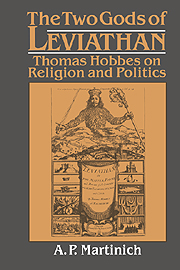Book contents
- Frontmatter
- Contents
- Acknowledgments
- A note on references
- Dedication
- INTRODUCTION
- PART I THE RELIGIOUS BACKGROUND TO HOBBES'S PHILOSOPHY
- PART II LAW, MORALITY, AND GOD
- PART III RELIGION WITHIN THE LIMITS OF SCIENCE AND POLITICS
- Conclusion
- Appendix A Curley on Hobbes
- Appendix B Skinner on Hobbes
- Appendix C The frontispiece to Leviathan
- Notes
- Bibliography
- Index
Appendix A - Curley on Hobbes
Published online by Cambridge University Press: 30 December 2009
- Frontmatter
- Contents
- Acknowledgments
- A note on references
- Dedication
- INTRODUCTION
- PART I THE RELIGIOUS BACKGROUND TO HOBBES'S PHILOSOPHY
- PART II LAW, MORALITY, AND GOD
- PART III RELIGION WITHIN THE LIMITS OF SCIENCE AND POLITICS
- Conclusion
- Appendix A Curley on Hobbes
- Appendix B Skinner on Hobbes
- Appendix C The frontispiece to Leviathan
- Notes
- Bibliography
- Index
Summary
Edwin Curley has presented the most sustained and wellwrought case that Hobbes was “rather likely … an atheist,” although Curley also says that “if someone were to insist that we'll never really know what Hobbes's religious beliefs were, I would cheerfully concede the point” (Curley, 1991, p. 57). He is motivated to explore the issue of Hobbes's alleged atheism because of an incident related in John Aubrey's biographical essay on Hobbes. Aubrey writes, “When Spinoza's Tractatus Theologico-Politicus first came out [1670], Mr. Edmund Waller sent it to my lord of Devonshire and desired send him word what Hobes said of it. Mr. H. told his lordship: – Ne judicate ne judicemini [Judge not that ye be not judged, Matt. 7:1]. He told me he [Spinoza] had outthrown him [Hobbes] a bar's length, for he durst not write so boldly” (Aubrey, 1680, 1:357).
While admitting that “we cannot infer much from the reported remark,” Curley nonetheless asks “what he might have meant by it” (Curley, 1991, p. 10). I think this question is fruitless to ask. First, Hobbes's own remark is so cryptic and vague that we have no idea what specifically he was talking about. Spinoza's Tractatus Theologico-Politicus is quite large. Was Hobbes thinking of some specific passages or the entire work? If only some passages, which? Even if Hobbes was thinking of the entire work, notice that Hobbes would perhaps not be remarking on the content of the work but its style.
- Type
- Chapter
- Information
- The Two Gods of LeviathanThomas Hobbes on Religion and Politics, pp. 339 - 353Publisher: Cambridge University PressPrint publication year: 1992

